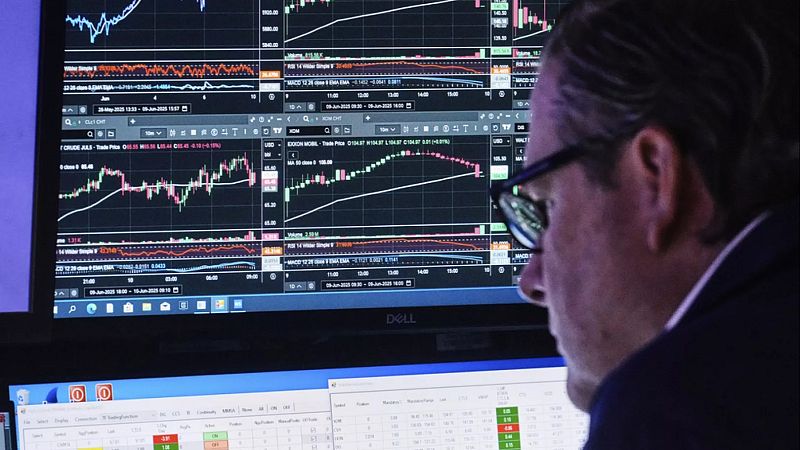
Oil prices gained more than $1 a barrel as share prices skidded in Europe and Asia on Tuesday after Israel's military issued an evacuation warning to 330,000 people in Iran's capital, Tehran. US futures also declined.
The latest alerts came as Israel warned that Iran’s capital, a city of 9.5 million, should be evacuated, and the US President Donald Trump announced he was returning from the G7 summit in Canada a day early due to the intensifying conflict.
Before leaving, Trump signed a trade deal with the UK, lowering tariffs on key British exports to the US, including cars, agricultural and aerospace products. Despite the promising news for the British economy, the main stock index in London, along with its European peers, started trading in a gloomy mood.
By midday in Europe, the FTSE 100 sank nearly 0.5%, Germany's DAX was in -1.3%, and the CAC 40 in Paris followed suit by dropping 1%. Madrid's IBEX 35 was losing 1.5% at this time.
“The UK stock market saw broad-based losses, with only six FTSE 100 stocks in positive territory. BP and Shell were among the rare risers as oil prices held firm after a recent rally,” Russ Mould, investment director at AJ Bell said.
In Germany, Rheinmetall was the biggest faller, “as investors locked in profits after a strong run for the defence group,” Mould said, adding that the current uncertainty across financial markets could bring the same fate to other “stocks or assets that have done well this year”.
After thriving on Monday, the main US stock indexes also showed signs of opening lower; the futures for the S&P 500 and the Dow Jones Industrial Average were down 0.6% after midday in Europe.
Mixed sentiment in Asia
In Asia, Tokyo's Nikkei 225 index climbed 0.6% to 38,536.74 as the Japanese central bank opted to keep its key interest rate unchanged at 0.5%.
The Bank of Japan (BOJ) has been gradually raising its rate from near zero and cutting back on its purchases of Japanese government bonds and other assets to help counter inflation.
It said economic growth was likely to moderate, and there was some weakness in consumer sentiment and housing investment.
"In particular, it is extremely uncertain how trade and policies in each jurisdiction will evolve and how overseas activity and prices will react to them," the BOJ's statement said.
Chinese shares edged lower. In Hong Kong, the Hang Seng shed 0.7% while the Shanghai Composite index was barely changed at 3,387.40.
In South Korea, the Kospi gained 0.1% to 2,950.30.
Australia's S&P/ASX 500 gave up 0.1% to 8,541.30. Taiwan's Taiex gained 0.7% and in Bangkok the SET was little changed.
Oil prices keep climbing
As Israel and Iran attack each other, the fear remains that a wider war could constrict the flow of Iran's oil to its customers. That in turn could raise gasoline prices worldwide and keep them high, though spikes in prices from previous conflicts have been brief.
Crude oil jumped 7% late last week after Israel's attack on Iranian nuclear and military targets. Early Tuesday, US benchmark crude oil gained 87 cents to $72.64 per barrel, while Brent crude, the international standard, was up 87 cents at $74.10 per barrel.
Meanwhile, the price of gold is inching lower after jumping on Friday, when investors were looking for someplace safe to park their cash. An ounce of gold fell by more than 0.3% to $3,405.
At 12h CET on Tuesday, the euro was stable against the US dollar, standing around 1.1565. The British pound has also lost slightly against the dollar, bringing the exchange rate to 1.3555. The Japanese yen first strengthened but then gave back, by midday a US dollar cost ¥144.75.
Investors have other concerns, key among them Donald Trump's tariffs, which still threaten to slow the US economy and raise inflation if Washington doesn't win trade deals with other countries.
What drives investors' hands this week?
The spectre of those tariffs was looming over the meeting of the Group of Seven (G7) meeting of major economies in Canada.
Later this week, the US Federal Reserve is set to discuss whether to lower or raise interest rates, with the decision due on Wednesday. The nearly unanimous expectation among traders and economists is that the Fed will not change interest rates.
The Federal Reserve has hesitated to lower interest rates after one cut late last year. It is waiting to see how much Trump's tariffs will hurt the economy and raise inflation, which has remained tame recently, and is near the Fed's 2% target.
More important for financial markets are forecasts for where Fed officials see the economy and interest rates heading in upcoming years.







